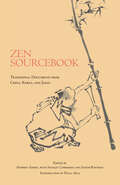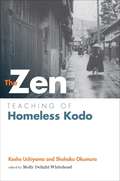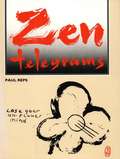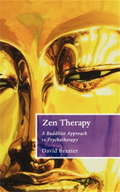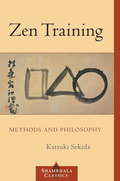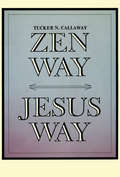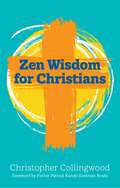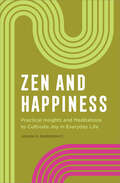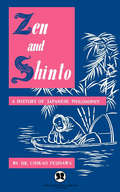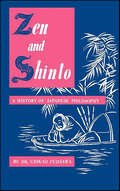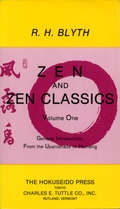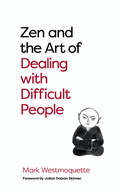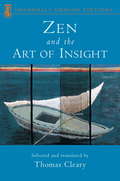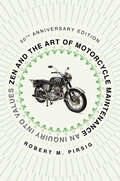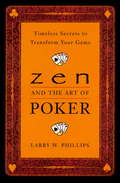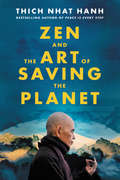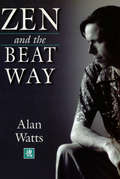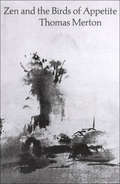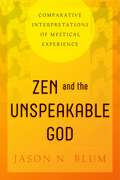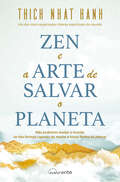- Table View
- List View
Zen Sourcebook: Traditional Documents from China, Korea, and Japan
by Stanley Lombardo Stephen Addiss Judith Roitman"Featuring a carefully selected collection of source documents, this tome includes traditional teaching tools from the Zen Buddhist traditions of China (Ch'an), Korea (Son), and Japan (Zen), including texts created by women. The selections provide both a good feel for the varieties of Zen and an experience of its common core. . . . The texts are experiential teachings and include storytelling, poetry, autobiographies, catechisms, calligraphy, paintings, and koans (paradoxical meditation questions that are intended to help aspirants transcend logical, linguistic limitations). Contextual commentary prefaces each text. Wade-Giles transliteration is used, although Pinyin, Korean, Japanese, and Sanskrit terms are linked in appendixes. An insightful introduction by Arai contributes a religious studies perspective. The bibliography references full translations of the selections. A thought-provoking discussion about the problems of translation is included. . . . Summing Up: Highly recommended. All levels." --Choice
Zen Teaching of Homeless Kodo
by Shohaku Okumura Kosho Uchiyama Roshi Jokei Molly WhiteheadAbandon your treasured delusions and hit the road with one of the most important Zen masters of twentieth-century Japan.Eschewing the entrapments of vanity, power, and money, "Homeless" Kodo Sawaki Roshi refused to accept a permanent position as a temple abbot, despite repeated offers. Instead, he lived a traveling, "homeless" life, going from temple to temple, student to student, teaching and instructing and never allowing himself to stray from his chosen path. He is responsible for making Soto Zen available to the common people outside of monasteries. His teachings are short, sharp, and powerful. Always clear, often funny, and sometimes uncomfortably close to home, they jolt us into awakening. Kosho Uchiyama expands and explains his teacher's wisdom with his commentary. Trained in Western philosophy, he draws parallels between Zen teachings and the Bible, Descartes, and Pascal. Shohaku Okumura has also added his own commentary, grounding his teachers' power and sagacity for the contemporary, Western practitioner. Experience the timeless, practical wisdom of three generations of Zen masters.
Zen Telegrams
by Paul RepsZen Telegrams is a collection of Reps's picture-poems," works of calligraphic art and minimalist poetry that first fascinated Japanese,then attracted Western viewers. A lesser artist trying to combine English text and Eastern art might have failed, but Reps was a rare talent, accomplished in a wide variety of literary genres and art forms and his unique work appeals to a universal audience.
Zen Telegrams
by Paul RepsZen Telegrams is a collection of Reps's picture-poems," works of calligraphic art and minimalist poetry that first fascinated Japanese,then attracted Western viewers. A lesser artist trying to combine English text and Eastern art might have failed, but Reps was a rare talent, accomplished in a wide variety of literary genres and art forms and his unique work appeals to a universal audience.
Zen Therapy: A Buddhist approach to psychotherapy
by David BrazierBuddhism, from Abhidharma to Zen, offers a practical path to harmony of head and heart. For over 2,000 years Buddhists have been developing sophisticated psychologies to guide the work of achieving freedom from mental suffering. Now East and West are beginning to learn from each other. In a readable and practical manner, this book challenges basic assumptions of Western psychology, demystifies Buddhist psychology and presents Zen as a therapy. Giving examples of its effectiveness in psychotherapeutic practice, the author shows how Zen derives from the Buddhist theory of the mind and throws new light upon the Buddhist theory of relations and conditions. This seminal wok is a resource full of intriguing and controversial ideas.
Zen Therapy: A Buddhist approach to psychotherapy
by David BrazierBuddhism, from Abhidharma to Zen, offers a practical path to harmony of head and heart. For over 2,000 years Buddhists have been developing sophisticated psychologies to guide the work of achieving freedom from mental suffering. Now East and West are beginning to learn from each other. In a readable and practical manner, this book challenges basic assumptions of Western psychology, demystifies Buddhist psychology and presents Zen as a therapy. Giving examples of its effectiveness in psychotherapeutic practice, the author shows how Zen derives from the Buddhist theory of the mind and throws new light upon the Buddhist theory of relations and conditions. This seminal wok is a resource full of intriguing and controversial ideas.
Zen Training: Methods and Philosophy
by Katsuki SekidaZen Training is a comprehensive handbook for zazen, seated meditation practice, and an authoritative presentation of the Zen path. The book marked a turning point in Zen literature in its critical reevaluation of the enlightenment experience, which the author believes has often been emphasized at the expense of other important aspects of Zen training. In addition, Zen Training goes beyond the first flashes of enlightenment to explore how one lives as well as trains in Zen. The author also draws many significant parallels between Zen and Western philosophy and psychology, comparing traditional Zen concepts with the theories of being and cognition of such thinkers as Heidegger and Husserl.
Zen War Stories (Routledge Critical Studies in Buddhism)
by Brian VictoriaFollowing the critically acclaimed Zen at War (1997), Brian Victoria explores the intimate relationship between Japanese institutional Buddhism and militarism during the Second World War.Victoria reveals for the first time, through examination of the wartime writings of the Japanese military itself, that the Zen school's view of life and death was deliberately incorporated into the military's programme of 'spiritual education' in order to develop a fanatical military spirit in both soldiers and civilians. Furthermore, that D. T. Suzuki, the most famous exponent of Zen in the West, is shown to have been a wartime proponent of this Zen-inspired viewpoint which enabled Japanese soldiers to leave for the battlefield already resigned to death. Victoria takes us onto the naval battlefield in the company of warrior-monk and Rinzai Zen Master Nakajima Genjô. We view the war in China through the eyes of a Buddhist military chaplain. The book also examines the relationship to Buddhism of Japan's seven Class-A war criminals who were hung by the Tokyo War Crimes Tribunal in 1948.A highly controversial study, this book will be of interest, first and foremost, to students of Zen as well as all those studying the history of this period, not to mention anyone concerned with the perennial question of the 'proper' relationship between religion and the state.
Zen Way - Jesus Way
by Tucker N. CallawayThis groundbreaking book successfully fuses the two overlapping traditions of Zen Buddhism and Christianity.Very few Christians who are interested in Zen Buddhism understand the fundamentals of the religion itself. <P><P>Most of the books which are available on Zen are superficial and fraught with caricatures and erroneous generalizations - concentrating more on meditation than on the real essence of Zen. Now the Christian who has been waiting for a clear and thorough explanation of Zen in terms he can understand has been provided with Zen Way--Jesus Way--a unique inside look at Christianity and Zen Buddhism by Dr. Tucker N. Callaway, a committed Christian missionary who for twenty years has practiced zazen in Japanese temples in an effort to reach the heart of the faith.Calloway has a knack for making philosophical concepts clear to the general reader and begins Zen Way--Jesus Way by presenting the fundamental presuppositions of Zen and several of the concepts which are logically deduced from them. Next he relates some of his experiences in Buddhist temples, while explaining the practical applications of Zen philosophy. Finally he interprets the Jesus Way in a manner that makes possible a genuine comparison with the Zen way.
Zen Wisdom for Christians
by Christopher CollingwoodAs spiritual paths, Zen and Christianity can learn from one another. In this book, Anglican priest and Zen teacher Christopher Collingwood sets out how Zen can return Christians to their roots with renewed energy, and allow others to consider Christianity in a new and more favourable light. For the many Christians searching for a greater depth of spirituality, Zen offers a way to achieve openness. Drawing on Zen experience and the teachings of Jesus as depicted in the gospels, Zen Wisdom for Christians enables Christians to explore avenues of thought and experience that are fresh and creative. Using examples of Zen koans and Zen readings of Christian texts, the author provides a radical reorientation of life - away from one based on self-centredness and the notion of a separate, isolated self, to a way that is inclusive and at one with all.Zen Wisdom for Christians proves that the practice of Zen can lead Christians towards deeper spirituality and enhance religious experience through mutual appreciation, in a way that is truly eye-opening and life-changing.
Zen and Happiness: Practical Insights and Meditations to Cultivate Joy in Everyday Life
by Joshua R. PaszkiewiczHone your Zen practice and harness joy Life is filled with thrilling highs, crushing lows, and everything in between. But often, we spend too much time planning for and reacting to our experiences, rather than simply "being" in them. This thoughtful guide shows you how to integrate Zen traditions into your daily life so you can focus on letting go, being present, and finding bliss in the moment. What makes this a standout among Zen books: Get an insight into Zen—Learn about the foundations of Zen as you delve into its Buddhist roots, investigate a beginner's mind, and gain greater awareness of how the practice spurs self-reflection. Redefine happiness—Through the lens of Zen Buddhism, see how mindfulness observations can help you achieve greater contentment. Develop a practice—Discover a range of exercises to help you put the principles of Zen into practice, from mindful eating to walking meditations. Cultivate happiness through regular Zen practice with help from this insightful guide.
Zen and Shinto
by Dr Chikao FujisawaHow do the Japanese talk about their native philosophy, Shinto, a decade and a half after the Western Allies abolished it as a state religion? What is its relationship to Buddhism, and particularly to Zen? How modern can this very ancient creed ever be? These are some of the questions considered in this study by Dr. Chikao Fujisawa, who specialized in the study of traditional Japanese philosophy and its effect on modern society. Zen and Shinto is a strong plea to rectify the steps taken to eradicate Shinto, the very substance of Japanese life and thought. At the same time, it offers new insight into the amazing adaptability of the Japanese psyche--its depth, vitality and universality--and its remarkable capacity to assimilate foreign thought and ideas, and thus contribute to the world's hope for permanent peace.
Zen and Shinto: A History of Japanese Philosophy
by Dr. Chikao FujisawaThis history of Japanese philosophical traditions underscores the importance of Zen and Shinto to the development of Japanese culture. How do the Japanese talk about their native philosophy, Shinto, so many years after the Western Allies abolished it as a state religion? What is its relationship to Buddhism, and particularly to Zen? How modern can this very ancient creed ever be? These are some of the questions considered in this analytic work by Dr. Chikao Fujisawa, who specializes in the study of traditional Japanese philosophy and its effect on modern society. Fujisawa&’s work is not only a survey of Zen and Shinto, but also an impassioned plea to restore Shinto as the very substance of Japanese life and thought. At the same time, Zen and Shinto offers new insight into the depth and vitality of Japanese culture, demonstrating its remarkable capacity to assimilate foreign thought and ideas, and thus contribute to the world&’s hope for permanent peace.
Zen and Zen Classics volume 1
by R. H. BlythThis is not a dry scholarly book on Zen.It is a fascinating introduction into a study of self-enlightenment and inner reason that has been a driving force of all Japanese culture. Written by Reginal Horace Blyth (1898-1964) this is a volume free of the dry pedantry that has hobbled so many well meaning French and English studies of Zen. It is free also of the breathless mystery-mongering that unfortunately has bloated American Zen.Blyth reads easily. The questions he poses; the views he offers....all lead to a sense of inner self and an awakening ofan awareness of the surrounding universe and one's relationshipto it.After discussing "What is Zen?" (and what isn't) Blyth sketches a history of Zen dating from 1000 B.C. to715A.D., the year of the death of the Sixth Patriarch, Huineg. With a historical background thus established, Blyth next providestranslations and commentary on some of the most important and basic Zen literature in existence. For the Zen initiate then, this book is an excellent beginning. For the practitioner, further meaningful revelations await.
Zen and Zen Classics volume 1
by R. H. BlythThis is not a dry scholarly book on Zen.It is a fascinating introduction into a study of self-enlightenment and inner reason that has been a driving force of all Japanese culture. Written by Reginal Horace Blyth (1898-1964) this is a volume free of the dry pedantry that has hobbled so many well meaning French and English studies of Zen. It is free also of the breathless mystery-mongering that unfortunately has bloated American Zen.Blyth reads easily. The questions he poses; the views he offers....all lead to a sense of inner self and an awakening ofan awareness of the surrounding universe and one's relationshipto it.After discussing "What is Zen?" (and what isn't) Blyth sketches a history of Zen dating from 1000 B.C. to715A.D., the year of the death of the Sixth Patriarch, Huineg. With a historical background thus established, Blyth next providestranslations and commentary on some of the most important and basic Zen literature in existence. For the Zen initiate then, this book is an excellent beginning. For the practitioner, further meaningful revelations await.
Zen and Zen Classics volume 1: From the Upanishads to Huineng
by R. H. BlythThis is not a dry scholarly book on Zen. It is a fascinating introduction into a study of self-enlightenment and inner reason that has been a driving force of all Japanese culture. Written by Reginal Horace Blyth (1898-1964) this is a volume free of the dry pedantry that has hobbled so many well meaning French and English studies of Zen. It is free also of the breathless mystery-mongering that unfortunately has bloated American Zen.Blyth reads easily. The questions he poses; the views he offers....all lead to a sense of inner self and an awakening of an awareness of the surrounding universe and one's relationship to it.After discussing "What is Zen?" (and what isn't) Blyth sketches a history of Zen dating from 1000 B.C. to715 A.D., the year of the death of the Sixth patriarch, Huineg. With a historical background thus established, Blyth next provides translations and commentary on some of the most important and basic Zen literature in existence. For the Zen initiate then, this book is an excellent beginning. For the practitioner, further meaningful revelations await.
Zen and the Art of Dealing with Difficult People
by Mark WestmoquetteThis is a unique guide to coping with challenging people using practical Zen and mindfulness tools. It helps readers explore their reactions, break free from knee-jerk response patterns and see if these people may in fact prove to be useful teachers in life – troublesome Buddhas.This is a guide to applying the teachings of mindfulness and Zen to the troublesome or challenging people in our lives. Perhaps you can see there&’s often a pattern to your behaviour in relation to them and that it often causes pain – perhaps a great deal of pain. The only way we can grow is by facing this pain, acknowledging how we feel and how we&’ve reacted, and making an intention or commitment to end this repeating pattern of suffering. In this book, Mark Westmoquette speaks from a place of profound personal experience. A Zen monk, he has endured two life-changing traumas caused by other people: his sexual abuse by his own father; and his stepfather&’s death and mother&’s very serious injury in a car crash due to the careless driving of an off-duty policeman. He stresses that by bringing awareness and kindness to these relationships, our initial stance of &“I can&’t stand this person, they need to change&” will naturally shift into something much broader and more inclusive. The book makes playful use of Zen koans – apparently nonsensical phrases or stories – to help jar us out of habitual ways of perceiving the world and nudge us toward a new perspective of wisdom and compassion.
Zen and the Art of Insight
by Thomas ClearyThe Prajnaparamita ("perfection of wisdom") sutras are one of the great legacies of Mahayana Buddhism, giving eloquent expression to some of that school's central concerns: the perception of shunyata, the essential emptiness of all phenomena; and the ideal of the bodhisattva, one who postpones his or her own enlightenment in order to work for the salvation of all beings. The Prajnaparamita literature consists of a number of texts composed in Buddhist India between 100 BCE and 100 CE. Originally written in Sanskrit, but surviving today mostly in their Chinese versions, the texts are concerned with the experience of profound insight that cannot be conveyed by concepts or in intellectual terms. The material remains important today in Mahayana Buddhism and Zen. Key selections from the Prajnaparamita literature are presented here, along with Thomas Cleary's illuminating commentary, as a means of demonstrating the intrinsic limitations of discursive thought, and of pointing to the profound wisdom that lies beyond it. Included are selections from: * The Scripture on Perfect Insight Awakening to Essence * The Essentials of the Great Scripture on Perfect Insight * Treatise on the Great Scripture on Perfect Insight * The Scripture on Perfect Insight for Benevolent Rulers * Key Teachings on the Great Scripture of Perfect Insight * The Questions of Suvikrantavikramin
Zen and the Art of Motorcycle Maintenance: An Inquiry Into Values (Perennial Classics Ser.)
by Robert M PirsigTHE CLASSIC BOOK THAT HAS INSPIRED MILLIONSA penetrating examination of how we live and how to live betterFew books transform a generation and then establish themselves as touchstones for the generations that follow. Zen and the Art of Motorcycle Maintenance is one such book. This modern epic of a man’s search for meaning became an instant bestseller on publication in 1974, acclaimed as one of the most exciting books in the history of American letters. It continues to inspire millions. A narration of a summer motorcycle trip undertaken by a father and his son, Zen and the Art of Motorcycle Maintenance becomes a personal and philosophical odyssey into fundamental questions on how to live. The narrator's relationship with his son leads to a powerful self-reckoning; the craft of motorcycle maintenance leads to an austerely beautiful process for reconciling science, religion, and humanism. Resonant with the confusions of existence, this classic is a touching and transcendent book of life.This new edition contains an interview with Pirsig and letters and documents detailing how this extraordinary book came to be.
Zen and the Art of Poker: Timeless Secrets to Transform Your Game
by Larry PhillipsInside the intriguing world of poker lies a fascinating exercise in strategy and extreme concentration--many of the same principles that underpin the one-thousand-year-old philosophy of Zen spirituality. Zen and the Art of Poker is the first book to apply Zen theories to America's most popular card game, presenting tips that readers can use to enhance their game. Among the more than one hundred rules that comprise this book, readers will learn to:* Make peace with folding* Use inaction as a weapon* Make patience a central pillar of their strategy* Pick their times of confrontationUsing a concise and spare style, in the tradition of Zen practices and rituals, Zen and the Art of Poker traces a parallel track connecting the two disciplines by giving comments and inspirational examples from the ancient Zen masters to the poker masters of today.
Zen and the Art of Saving the Planet
by Thich Nhat Hanh“When you wake up and you see that the Earth is not just the environment, the Earth is us, you touch the nature of interbeing. And at that moment you can have real communication with the Earth… We have to wake up together. And if we wake up together, then we have a chance. Our way of living our life and planning our future has led us into this situation. And now we need to look deeply to find a way out, not only as individuals, but as a collective, a species.”-- Thich Nhat HanhWe face a potent intersection of crises: ecological destruction, rising inequality, racial injustice, and the lasting impacts of a devastating pandemic. The situation is beyond urgent. To face these challenges, we need to find ways to strengthen our clarity, compassion, and courage to act.Beloved Zen Master Thich Nhat Hanh is blazingly clear: there’s one thing we all have the power to change, which can make all the difference, and that is our mind. Our way of looking, seeing, and thinking determines every choice we make, the everyday actions we take or avoid, how we relate to those we love or oppose, and how we react in a crisis.Mindfulness and the radical insights of Zen meditation can give us the strength and clarity we need to help create a regenerative world in which all life is respected. Filled with Thich Nhat Hanh’s inspiring meditations, Zen stories and experiences from his own activism, as well as commentary from Sister True Dedication, one of his students Zen and the Art of Saving the Planet shows us a new way of seeing and living that can bring healing and harmony to ourselves, our relationships, and the Earth.
Zen and the Beat Way
by Alan WattsZen and the Beat Way is based upon selections from Alan Watts's early radio talks, many of which were first aired on the Pacifica Radio Network in the late fifties and early sixties, and sessions from two of his most compelling seminarsin the mid-sixties.
Zen and the Birds of Appetite
by Thomas Merton"Zen enriches no one," Thomas Merton provocatively writes in his opening statement to Zen and the Birds of Appetite--one of the last books to be published before his death in 1968. "There is no body to be found. The birds may come and circle for a while. . . but they soon go elsewhere. When they are gone, the 'nothing,' the 'no-body' that was there, suddenly appears. That is Zen. It was there all the time but the scavengers missed it, because it was not their kind of prey. " This gets at the humor, paradox, and joy that one feels in Merton's discoveries of Zen during the last years of his life, a joy very much present in this collection of essays. Exploring the relationship between Christianity and Zen, especially through his dialogue with the great Zen teacher D. T. Suzuki, the book makes an excellent introduction to a comparative study of these two traditions, as well as giving the reader a strong taste of the mature Merton. Never does one feel him losing his own faith in these pages; rather one feels that faith getting deeply clarified and affirmed. Just as the body of "Zen" cannot be found by the scavengers, so too, Merton suggests, with the eternal truth of Christ.
Zen and the Unspeakable God: Comparative Interpretations of Mystical Experience
by Jason N. BlumZen and the Unspeakable God reevaluates how we study mystical experience. Forsaking the prescriptive epistemological box that has constrained the conversation for decades, ensuring that methodology has overshadowed subject matter, Jason Blum proposes a new interpretive approach—one that begins with a mystic’s own beliefs about the nature of mystical experience. Blum brings this approach to bear on the experiential accounts of three mystical exemplars: Meister Eckhart, Ibn al-ʿArabi, and Hui-neng. Through close readings of their texts, he uncovers the mystics’ own fundamental assumptions about transcendence and harnesses these as interpretive guides to their experiences.The predominant theory-first path to interpretation has led to the misunderstanding and misrepresentation of individual mystical experiences and fostered specious conclusions about cross-cultural comparability among them. Blum’s hermeneutic invites the scholarly community to begin thinking about mystical experience in a new way—through the mystics’ eyes. Zen and the Unspeakable God offers a sampling of the provocative results of this technique and an explanation of its implications for theories of consciousness and our contemporary understanding of the nature of mystical experience.
Zen e a Arte de Salvar o Planeta
by Thich Nhat HanhO livro mais recente de um dos mais respeitados líderes espirituais do mundo. Não podemos mudar o mundo se não formos capazes de mudar a nossa forma de pensar. Atualmente, enfrentamos uma poderosa interseção de crises: destruição ecológica, colapso climático, aumento da desigualdade, injustiça racial e os impactos duradouros de uma pandemia devastadora. Para enfrentarmos estes desafios, precisamos de encontrar formas de fortalecer a nossa lucidez, compaixão e coragem para agir. A mensagem de Thich Nhat Hanh é muito clara: existe algo que temos o poder de mudar, que fará toda a diferença, e esse algo é a nossa mente. A nossa forma de olhar e de pensar as coisas determina as ações e decisões que tomamos ou evitamos, como nos relacionamos com aqueles que amamos ou de quem discordamos, e como reagimos numa crise. O mindfulness e as visões decisivas da meditação podem ajudar-nos a criar um mundo regenerativo em que todas as vidas sejam respeitadas. Zen e a Arte de Salvar o Planeta mostra-nos uma nova forma de viver e de trazer harmonia a nós próprios, aos nossos relacionamentos e à Terra. «Precisamos de despertar juntos e, se despertarmos juntos, teremos uma hipótese. A nossa forma de viver e planear o futuro conduziu-nos a esta situação. E agora precisamos de olhar profundamente para encontrarmos uma solução, não apenas como indivíduos, mas como um coletivo, uma espécie.» — Thich Nhat Hanh «Thich Nhat Hanh mostra-nos a íntima ligação entre uma pessoa, a sua paz interior e a paz no mundo.» Dalai Lama «Pode ser difícil manter uma atitude positiva e sentir esperança. Neste livro, o monge vietnamita, professor, autor, poeta e ativista da paz, Thich Nhat Hanh, aplica a sabedoria budista à vida quotidiana, ajudando os leitores a fazerem as pazes com o seu lugar no mundo e dando-lhes as ferramentas para aceitarem as circunstâncias que fogem de seu controlo.» Booklist
